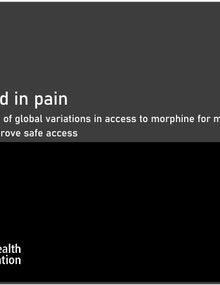Overview
Morphine is an essential medicine for relieving moderate to severe pain. It is also essential for treating severe breathlessness that is refractory to treatment of the underlying cause, especially at the end of life. Its medical uses span multiple clinical settings in today’s medical practice, including surgical care, cancer care, palliative care, emergency care, paediatric care, and long-term care. It is the most basic requirement for the provision of palliative care, as noted by the Lancet Commission on Palliative Care and Pain Relief: “[morphine] must be available both as an oral, immediate-release preparation and as an injectable preparation for any patient with moderate or severe pain or with terminal dyspnoea”.
Safe and timely access to morphine is important for public health, but access is known to be concerningly inadequate in many countries. This report describes the extent and causes of global variations in access to morphine for medical use. It seeks to understand the enablers for and barriers to safe access to morphine for medical use, and proposes actions through balanced policy to address them.
Downloads
Web Annex A Survey Questionnaire
Web Annex B WHO Survey Findings
|

